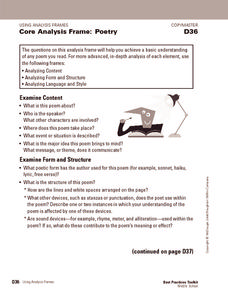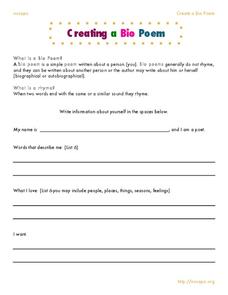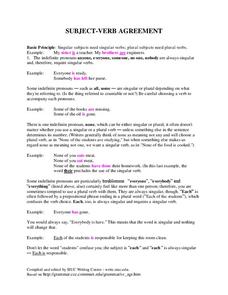National Park Service
The Poet's Toolbox
If you need a lesson for your poetry unit, use two poems by Henry Wadsworth Longfellow ("Rain in Summer" and "The Slave in the Dismal Swamp") and a resource on Elements of Poetry. The lesson plan guides you through activities on...
Waterford Union High School
Writing the Persuasive Essay
An excellent, in-depth resource would be an asset to your unit on writing an argument essay. It provides an explanation to each part of the essay as well as examples of transition words to strengthen your kids' writing. Additionally, the...
Learning Seed
The Art of Listening
Conversation isn't just about talking. Help you class work on the important conversational skills with a lesson plan about listening. As youngsters practice making statements and asking attentive questions, they reflect on the way they...
Urban Education Exchange
Lessons and Units: The Watsons go to Birmingham—1963 5TH GRADE UNIT
Get ready to read The Watsons Go to Birmingham - 1963 with a lesson about historical fiction. Spanning several centuries, the resource prompts learners to guess the historical era of a story based on a word or phrase in the text. In...
Saylor Academy
Persuasive Techniques
Want to safeguard your students against peer pressure? Teach them all about rhetorical appeals, common attack methods, and various argument tones with a reference sheet on persuasive techniques.
MENSA Education & Research Foundation
The Writer’s Toolbox: What You Need to Master the Craft
Strengthen your high schoolers' writing with a series of steps for writing successfully. With sections on organizing an essay, choosing a topic, crafting a thesis statement, and revising a draft, the lesson encourages your class to...
Novelinks
The View From Saturday: Concept/Vocabulary Analysis
Design your unit on The View From Saturday by E.L. Konigsburg with a concept and vocabulary analysis resource. It outlines the plot, literary elements, vocabulary issues, and any possible considerations for planning a differentiated...
Road to Grammar
Five Presentation Tips
Talking in front of others can be intimidating, especially when you aren't speaking in your native language. Put your English language learners at ease before a class presentation. They can follow these tips to give relaxed and effective...
Jolly Learning Ltd
Jolly Grammar Action Chart
An excellent grammar reference page from Jolly Phonics provides definitions and actions to remember several fundamental parts of speech. The methods are interesting for learners who have a hard time remembering the differences between...
Houghton Mifflin Harcourt
Core Analysis Frame: Poetry
Dig deep into any piece of poetry with a set of analysis questions. Ponder the content, form, and language of poetry and provide some question for critique. The first two pages include general questions, and the remainder of the document...
Road to Grammar
Five Ways to Speak More Naturally
Help your English language learners move toward conversing like native speakers. This document includes five easy sentence structure changes that make a big difference when speaking in English. Examples and explanations are included for...
Ohio Literacy Resource Center
Arguing with Aristotle Ethos, Pathos, Logos
Introduce your classes to the Art of Rhetoric with a lesson that focuses on Aristotle's persuasive appeals and how they have been used, both ethically and unethically, to influence opinion.
Curated OER
Tips for Improving Transition
Vary, bury, pull, fit. These tips for improving transitions in writing are found on a template designed as a teacher resource. A clever way to make memorable these suggestions for improving transitions in writing, the language in the...
Curated OER
The Goldilocks Rules for Choosing a Book That Is “Just Right”
With so many books to choose from, it can be hard for young readers to find the right one. Help children overcome this problem with this list of rules for identifying books that are too easy, too hard, and those that are just right.
Curated OER
Identify the Parts of a Newspaper features of informational text, newspaper format
Young readers make sense out of the wealth of information in newspapers with this helpful reference document. Pointing out basic features like headings, articles, bylines, and captions this resource is a great tool for introducing...
Curated OER
Summarizing with Somebody Wanted But So
Teach your young readers how to summarize a text using a strategy called Somebody Wanted But So. Kids identify the character (Somebody), the motivation (Wanted), the conflict (But), and the resolution (So). The resource comes with...
K12 Reader
Narrator’s Point of View Flow Chart
How can you tell what point of view a narrator is using, and why does it matter when reading or writing? Use a handy flow chart to determine whether or not your narrator is telling the story from a first or third person point of view.
Nosapo
Pronouns: Personal Pronouns, Demonstrative Pronouns
Which do you use: that or this? Which or where? Me or I? Practice pronoun use with a series of activities that focus on personal and demonstrative pronouns.
Nosapo
Creating a Bio Poem
Find out what's special about your pupils with a fun biopoem activity! As they fill out their name, words that describe them, what they love, and what they dream of, learners create an expressive poem about themselves.
Nosapo
Family Titles, Pronouns, Writing about a Person
How is your grandmother related to you? How is your cousin related to your grandmother? Learn about family relationships and pronouns with an activity that guides pupils to write two short narratives about members of their families.
Southern Illinois University
Subject-Verb Agreement
Your writing lessons may be all about solid arguments, but in grammar, it's all about agreement! Learners practice identifying proper and improper verb form in a worksheet focused on subject-verb agreement and indefinite pronouns.
Pittford Schools
Literary Devices, Techniques, and Elements
What's the difference between a speaker and an author? What's an example of anthropomorphism? Clarify the meanings of literary devices, elements, and techniques with a comprehensive glossary of terms.
New York State University
Pronoun-Antecedent Agreement
Nothing ruins a good sentence like a disagreement between a pronoun and its antecedent! Clear up awkward phrasing in your learners' writing with a helpful reference sheet that notes correct and incorrect ways to use singular pronouns.
Walters Art Museum
The Symbolism of Allegorical Art
Introduce learners to allegorical art with four bronze sculptures by Francesco Bertos. After modeling how to recognize bias and allegory in Bertos' Africa, class groups examine the other three sculptures in the series before creating...
Other popular searches
- 5th Grade Language Arts
- 3rd Grade Language Arts
- 4th Grade Language Arts
- Second Grade Language Arts
- English Language Arts
- 1st Grade Language Arts
- Kindergarten Language Arts
- Language Arts Jeopardy Game
- First Grade Language Arts
- Language Arts School Projects
- Language Arts Lesson Plans
- Language Arts Games

























